tony simpson
Articles:
Defence in an Age of Climate Change (August 2025)
Submission on the Treaty of Waitangi Principles Bill (November 2024)
The Proposed Regulatory Standards Bill (January 2025)
Mr Micawber’s Outcome (December 2024)
What is New Zealand for? (November 2024)
Waitangi – An Alternative View (March 2024)
Who’s Afraid of Fu Manchu? (January 2023)
The Camel with Only One Leg (March 2022 )
Tony’s Biography
Tony Simpson (born Rangiora, North Canterbury in 1945) is the author of twenty published books, mostly of social history, and the first of which The Sugarbag Years, an oral history of the Depression of the thirties won widespread acclaim, and most recently A Gent in Overseasia, recounting overseas adventures, and Along for the Ride, a political memoir. Other of his works have been widely praised although controversial in some respects, particularly Te Riri Pakeha, his account of how Maori lost most of their land between 1840 and 1970, and Before Hobson , a less than orthodox treatment of the political and economic background to the Treaty of Waitangi
He has worked over the years as a journalist, as a writer and producer in television, film and radio, a union advocate, but mainly as a public servant, and most recently as senior policy advisor to Cabinet Minister Jim Anderton before the latter retired in 2011. He now writes full time and runs a small publishing company, the Blythswood Press, in Wellington.
He is a past president of the New Zealand Society of Authors, and in 2005 was awarded the New Zealand Order of Merit for services to historical research.
Why I am a Writer

I could read and write before I went to school. How that happened I don’t really know, but that short sentence contains the answer to the question posed by the title of this piece.
When I was growing up in the nineteen fifties, New Zealand was often officially described as “a lovely place to bring up the kiddies”. It may well have been for some kids, but not in my experience. As the current enquiry into abuse in institutional care demonstrates, for some children it was a chamber of horrors. Not everybody spent their childhood at that extreme end of the spectrum, but that didn’t mean it was paradise for the rest of us. Violence against children was sanctioned and approved as a means of disciplining the recalcitrant by both parents and schools, and was used regularly and often.
New Zealand in that period was an authoritarian society where everything was forbidden or frowned on unless it was specifically allowed – in which case it was compulsory. The system this entailed was run by fat, middle-aged white men in ill-fitting suits, with RSA badges prominently displayed. This authoritarianism applied to adults as well as children. Don’t forget it was a society which almost subjected Janet Frame – who was later to be several times nominated for the Nobel Prize for Literature – to electric shock treatment to ‘cure’ her of her ‘peculiarity’; i.e., the capacity to write brilliant and imaginative prose. Kids who stepped out of line by showing unusual talents could be – and were – often punished for it. I know, because it happened regularly to me.
I went off to school not knowing what was in store for me, and foolishly and innocently displayed my precocious literary habits. I soon learned to be much more circumspect, and from that point and throughout my childhood lived two lives. There was the world of school and adults whose requirements I generally met, although there were occasional outbreaks of defiance, insolence, and what was described as ‘showing off’ when I couldn’t stand adult foolishness or even outright stupidity any more, and showed my hand. As a result I was expelled from at least one school. But by the time I left secondary school I had learned to a very fine point how far you could go without stepping over the line and incurring punishment.
My other life was in the universe of books, where I read what and where I liked far in advance of my chronological reading age, particularly seeking out those things we were discouraged from reading or were actually forbidden by some fairly strict censorship laws. This included, for example, most of the works of D H Lawrence and the writings of the Restoration poet John Wilmott, which I particularly admired; but there were many others.
I often used to wonder from time to time how I had metaphorically got through the restraining fence and into forbidden lands. Many years later I discovered the answer; I had a form of undiagnosed autism called Asperger’s Syndrome. This curious condition with which perhaps 0.07% of the population are born enables those who have it to make connections in the real world of social activity which no-one else can see, and, as in my case, to express these connections in fluent written narrative (or in other cases musical or mathematical notation). In children it is an affliction because it earns them a reputation for being a smart alec. But as an adult it can be a considerable positive advantage.
The upshot was that I arrived at the end of my university career – despite efforts to stop me getting there in the first place and then the vetoing of my original intent to major in history by Canterbury University’s then head of History (Neville Phillips) on the grounds that “I had no future as an historian” – not just with postgraduate qualifications in the social sciences, but the beginnings of the ability to write spare and ironic prose sharpened by wit. My hero in that regard was George Orwell, who says in his essay “Why I Write” (1946) that good prose is like a window pane – you can see things through it.
Following my first real job as a radio producer for one of the forerunners of Radio New Zealand, I further learned the superiority of active voice over passive, and later, the uses of statistical analysis; augmented in due course by the things you could do with imagination and a computer keyboard. Throughout this time I continued to write for magazines both here and overseas (the Nation Review in Australia, the New Statesman in the U K, and for various student papers and then The Listener in this country). Mostly this writing was informed by the same bolshie attitude which I have always exhibited, and I trust continue to do so.
This of course got me into trouble from time to time, and my life in broadcasting was made sufficiently uncomfortable to encourage me to leave (for the union, the PSA, which allowed me to continue to harass the broadcasting management from a place of relative safety – served them right for being nasty to me). I had by now discovered that the ability to make connections and describe them in coherent narrative was a much sought-after skill which allowed me to pick and choose my employers, and to leave them whenever I came to dislike or even despise them. This meant that I was a relatively free agent living by my writing skills. But my broadcasting stint also led to two epiphanies.
The first of these arose from the nature of the documentaries I was making on New Zealand historical topics. What struck me most of all about the people I was interviewing – mostly elderly and usually in their seventies – was the coherence of their accounts of their own lives, in which they almost always identified milestones which framed their experience. These usually involved the two world wars (remember this was the seventies, when there was still quite a lot of WW I veterans and others of their generation still around) bracketing their experience of the Great Depression of the thirties, the advent of the Savage government, and the creation of the welfare state. Throughout six years of comprehensive social and political science at the University of Canterbury, coupled with some postgraduate study in history in classics and sinology (so much for you, Professor Phillips), no-one had mentioned or drawn upon the sort of popular memory which I was mining for my documentary work.
I became fascinated by this popular folk memory, and sought other ways of ensuring its presentation besides my documentaries. After I had left broadcasting I landed on what I thought was the appropriate vehicle for doing this. I had run across the writings of the American oral historian Studs Terkel, and it occurred to me that his work Hard Times, an oral history of the Great Depression in the United States, could be replicated in similar form here. I knew enough about publishing not to embark on a project without taking it to a publisher first. But almost without exception they poured cold water on the idea. Some expressed bewilderment at the whole notion of an oral history; they had never heard of such a thing. Others who cottoned on simply dismissed it as an idea which would not find a market as a book. The exception was Alister Taylor, whom I had approached warily. I knew about his reputation for being slow to pay his bills, because I had written for two magazines he had edited. But he instantly and enthusiastically ‘got it’, agreed to the project, and I set to work.
The upshot was my first book The Sugarbag Years, published in 1974. From the outset it was universally praised and a runaway hit – a heady experience for a tyro writer. Notwithstanding the gloomy prognostications of the publishers who had rejected it, it sold many thousands of copies, and was eventually taken up by four publishers who continued to sell it in quantities well past the point when their predecessors thought it had run out of market. It was continuously in print for some twenty-five years, and made me enough money to purchase my first house.
It also established me as a writer, although not one who appealed to the academic history establishment. As far as they were concerned I was an interloper who should not be writing history at all, let alone making the sort of career in popular social, cultural, and political history writing upon which I then embarked and in which I am still engaged some eighteen books later. Some of the new school of academic historians, who are no doubt aware of the very strong tradition of popular history writing in the United States and Britain, will now concede that my work has some value. But I have always relished my status as an outsider, and one way or the other I don’t give a flying fig for the opinion of most academics.
My other epiphany was to do with one of my radio documentary programmes – an exploration of the reasons why the Maori ‘prophet’ (so-called, often dismissively by pakeha) was arrested by armed police in his Urewera settlement of Maungapohatu in 1916, to the accompaniment of serious bloodshed on the Maori side (possibly as a result of deliberate provocations by the leaders of the police expedition). This required me to visit Ruatahuna and to interview some leaders of high mana about this subject. I have since come to understand the impudence of what I was about, but I was young, had at least the nous to take advice on how I should proceed and, luckily, followed it to the letter. In retrospect I can see with what kindness the Tuhoe treated this ignorant stranger who had come all unaware enquiring into some very sacred things. And so for whatever reason, instead of telling me to go away they acceded to my request for an interview with a senior rangatira, which took me into some astonishing territory of the mind.
The programme was, I believe, an interesting and informative one at a time when some pakeha were beginning to come alive to the fact that New Zealand was home to two cultures, and that the prevailing mythology – that this was “the most successful multi-racial society in the world” – was a hollow sham and alibi for what had really happened here in the nineteenth century and into the present time. The effect on me personally, however, was shattering and life changing.
Consider my situation: a young lad who had grown up in Christchurch where nary a brown face was to be seen in the streets, with no friends or contacts in Maoridom. Nor, apart from one single exception as I grew up, did the Treaty of Waitangi get a mention. The exception was a primary school teacher of Maori descent, who on a couple of occasions mentioned injustices arising from its non-observance; but I recall that only because it was unusual, and he could never in any event be induced to explain further. Coming to Wellington, of course, increased the number of brown faces in the street exponentially; but I was still acquainted with few Maori, and that superficially. Of course James K Baxter was much in evidence; but although he wrote some fine poetry he was not a Maori, whatever his pretend credentials. I always regarded him as a charlatan when it came to his political causes, and so I gave him a wide birth.
To then be suddenly immersed for a week in a culture whose first language was not English and which lived a life governed by cultural forms and requirements of which I knew nothing, blew several of my fuses. But what did stick with me was the realisation that here was the other end of the Maori concerns hinted at by that long-ago primary school teacher. I returned from Ruatahuna determined to learn more. It wasn’t all that difficult to do so when I set my mind to it; the information I needed was everywhere when you took the trouble to look. And what I discovered was a whole new country living inside the country I lived in and thought I knew about, with its own culture and a history of the relationship between themselves and the pakeha. Not only that, but the injustices to which my interlocutors in Ruatahuna referred were real, palpable, and remained unresolved.
Since that time I trust my writing has been informed by that knowledge. It has led to two books: Te Riri Pakeha: The White Man‘s Anger (1980), and Before Hobson (2015). The former is a straightforward factual account of how Maori came to lose most of their land between 1840 and 1970, which I wrote because I could not find another overall account. I also wrote it while living for some years in London to remind myself of what it meant to be a New Zealander. The latter deals with what I have come to call the pakeha whakapapa of the Treaty of Waitangi, which is now much more widely known … although not everyone is happy with the outcomes of that knowledge. I wrote that book because I thought, and continue to think, that the present orthodox reading of the Treaty lets the authorities and others responsible for inducing Maori to sign it in the first place off much too lightly, when that process is most kindly described as less than honest in its motivations. It is one of history’s most amusing ironies that a document described at the time by Joseph Somes, chairman of the New Zealand Company as “a harmless device for pacifying naked savages” has returned to bite the pakeha authorities in the bum by way of an insistence that its terms be honoured (something which I heartily endorse).
Finally, there is something to which I should allude as an influence on my writing, even if in a negative sense. I have been fully aware since I was fifteen years old that I am gay (although that word was not then in currency). However until after 1986 I was ‘in the closet’ to other than my closest friends, for the obvious reason that you could go to jail for up to seven years for practising homosexual acts. That notwithstanding, I do not regard being gay as defining my identity; my principal identity is that I am an anti-establishment writer. I am with Gore Vidal in that regard; he once said that ‘homosexual’ to him was not a noun but an adjective: i.e., a description of a particular sexual preference which although inherent from birth does not of itself define the person.
That said, however, it does determine the genre of writing in which I am most at home. Writing fiction as novels or short stories would have meant drawing too much on my personal experience to address that of prospective readers at the risk of revealing myself in a society where it was dangerous to do so. But it also explains in part my stance as an anti-establishment writer. I have no motivation to praise the intolerant and bigoted society which was my experience in growing up here (and hasn’t improved as much as some would like to think), and every reason to point out the hypocrisy of those who condemn or persecute others while being themselves at best the passive beneficiaries of past injustices towards children, towards Maori, towards women, the disabled, kids growing up LGBTQ+, and a general and miscellaneous crowd of the alienated and dispossessed. My task is not to comfort the afflicted; my task is to afflict the comfortable.
And so I go on writing, hoping that it will make a difference, and always remembering the dictum of the Italian Marxist Antonio Gramsci, who said: “Let your pessimism of analysis be matched by the optimism of your will.”
Tony Simpson
December 2021
Click here for Tony’s bibliography
NEW: A Gent in Overseasia

While most English speaking people use “overseas” as an adjective in New Zealand it is uniquely a noun – Overseas, meaning all the rest of the world. In 1973 twenty eight year old Tony Simpson embarked for this exotic country for the first time by way of Sweden and the then Soviet Union. Along the way he fell victim to the travel bug, which once contracted cannot be cured. As he says himself the more he saw of overseas the more he wanted to see more of it. In this new book, described by fellow writer Steve Braunias as “charming” and driven by insatiable curiosity he describes the strange places and situations he has, usually inadvertently, found himself in over the last fifty years
The Scone in New Zealand Literature and Other Essays 1990-2012
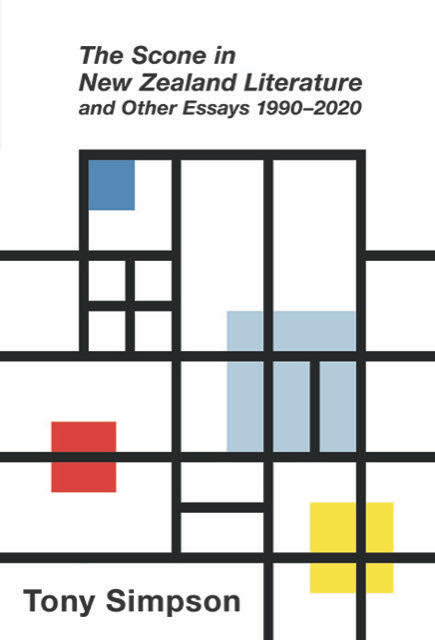
Over the years Tony has written or presented many essays and talks, and prepared research papers, on a surprisingly wide range of topics. Sometimes these have been purely for fun as intellectual knockabout, but others are political such as the nature of our defence policy and why it does not serve New Zealand. Quite often they are directed to puncturing the pretensions of the pompous and the solemn, particularly of those with academic pretensions. This book brings a selection of them together in one volume.
Along for the Ride
(2018)
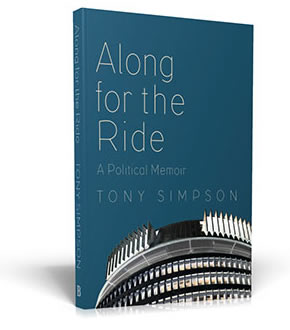
“At the age of five I went along to school fully prepared to cooperate with the authorities; at three o’clock I came home with a lifelong hatred of oppressive government.” So begins Tony Simpson’s political memoir; that day also marked the beginning of a nearly seventy year battle with the authorities and their biblical precept: thou shalt not!
In the course of this warfare he was expelled from one school, initially denied access to university, and told he had no future as an historian. Along the way he had several confrontations with sometime Prime Minister Robert Muldoon, observed at close hand the rise of Margaret Thatcher, survived the 1981 Springbok Tour, and was outraged by the disaster of the Lange government. Despite this, after further twists and turns he ended up as a senior advisor to the Deputy Prime Minister Jim Anderton. Somehow he retained his wry sense of humour which shines through this book and throws light on some very murky goings on.
Click here to purchase “Along for the Ride”.
Before Hobson
(2015)
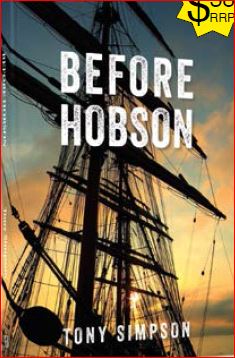
Over the last three decades the Treaty of Waitangi has become a crucial point of reference for understanding the historical and contemporary relationship between Maori and pakeha in New Zealand. It is rarely seen, however, in its broader context as an event in the history of New South Wales, the economy of the South Pacific, and political events in Britain during the four decades leading to its signature in February 1840 and after. The book explores the context within which this happened and arrives at some surprising conclusions regarding the establishment of British sovereignty over this country.
Ambiguity & Innocence
(2013)
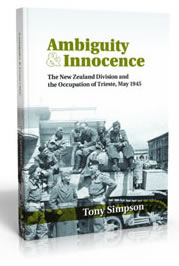
This is an account of the context within which the New Zealand Division (2NZEF) occupied the Adriatic city of Trieste in May and June 1945 in the face of opposition from the Yugoslav partisan army of Marshall Josip Tito. The resulting standoff almost led to further fighting between these erstwhile allies, although the Yugoslavs ultimately realised they could not have sustained this and withdrew. It was the last episode of the Second World War in Europe and simultaneously the first episode of what has become known as the Cold War. Although it focusses initially on the two months of confrontation and draws on the experience of the New Zealand soldiers, the civilians in the city at the time, and some of the partisans who took part, it then draws back and explains the chequered history of the region and the curiously ambiguous character of the city itself, and of the Italians, Germans and Serbo/Croats who laid claim to it.
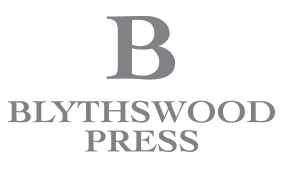
Blythswood Press is the personal publishing house of New Zealand historian Tony Simpson. So far two books have been published entirely under its auspices and another under the imprint of Silver Fox, the publishing operation of Tony’s friend and fellow writer David McGill. “Since electronic print on demand has become readily available,” says Tony, “I can now do the shorter runs suitable for the New Zealand market for specialised publications, and use local designers, editors, printers and other professionals. I also prefer to sell retail through local bookshops
To purchase any of the following books wholesale or to make enquiries please fill in the form below.
Major Publications
The Sugarbag Years (Alister Taylor Martinborough) 1974, Reprinted Hodder & Stoughton 1983, Penguin Books 1990, and Godwit Publishing 1997. 0340 25822X
The Road to Erewhon (Beaux Arts Auckland) 1976 o589 00972 9
The Scrim-Lee Papers with C G Scrimgeour & John A Lee (Reed Wellington) 1977
Te Riri Pakeha (Alister Taylor Martinborough) 1979. Reprinted Hodder & Stoughton 1983 0340 401095
Operation Mercury: The Battle for Crete 1941 (Hodder & Stoughton London) 1981 0340 23118 1
What Happened at Rangiaowhia (National Council of Churches Auckland) 1983
A Vision Betrayed: The Decline of Democracy in New Zealand (Hodder & Stoughton Auckland) 1984 0340 338768
An Innocent Delight (Hodder & Stoughton Auckland) 1986 0340 358211
The Slump (Penguin) 1990 A narrative history of the Depression of the thirties. As a joint imprint with the reprinted The Sugarbag Years 614 012752 8
A Cargo of Flax (Blacklight) 1991
Shame and Disgrace : A History of Lost Scandals (Penguin) 1992 0140 127518
Art & Massacre : Documentary Racism in ‘The Burning of the Boyd’ (Cultural Construction)1993 0473 01828 4
The Immigrants (Godwit Publishing 1997)
A Distant Feast (Random House 1999 reprinted in a new format 2008) 1 869 62 037 2
Ambiguity & Innocence: The New Zealand Division and the Occupation of Trieste May 1945 (Silver Owl 2013) 978 0 9864519 8 0
Before Hobson New Zealand, the Treaty of Waitangi & the Wider World (Blythswood Press 2015) 978 0 473 31284 8
Along For The Ride: A Political Memoir (Blythswood Press 2017)
To enquire about books or to contact Tony, fill in the form below, or email [email protected]